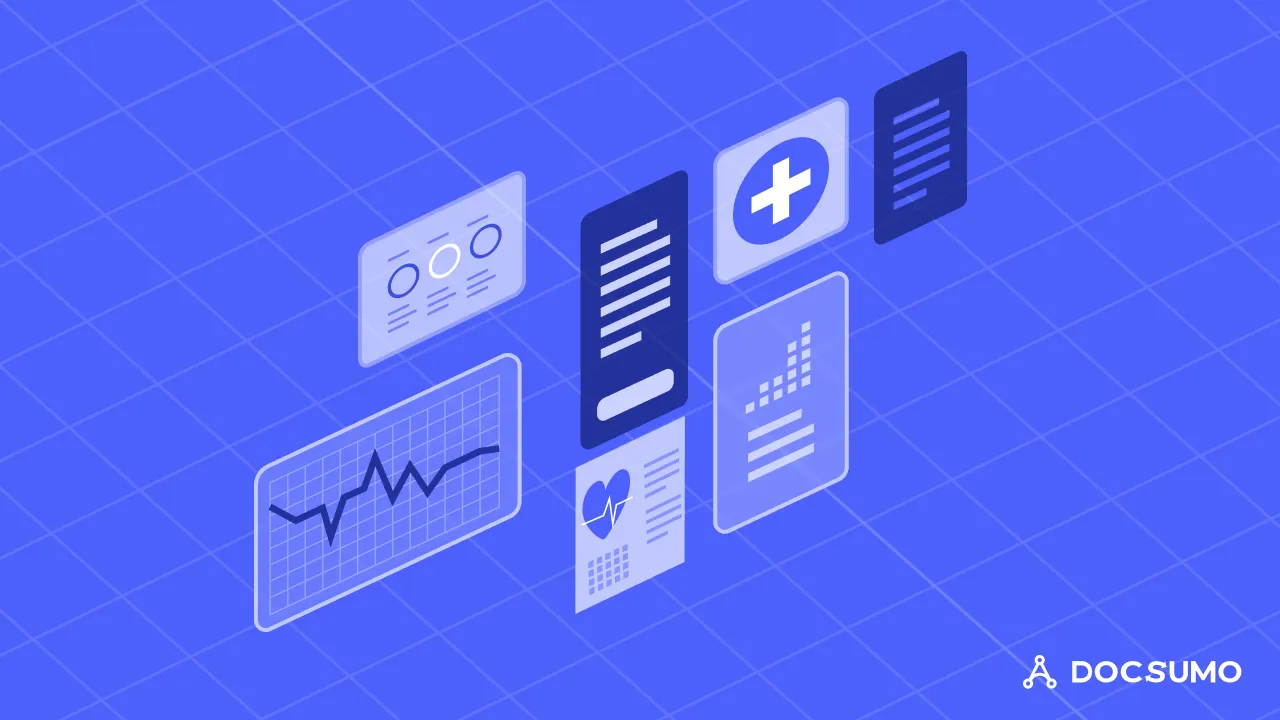Suggested
12 Best Document Data Extraction Software in 2025 (Paid & Free)
In hospitals and clinics, it extracts crucial information from various documents - like discharge summaries, lab reports, and insurance claims. Data extraction makes healthcare system where patient data flows seamlessly and automating tasks easy.

Data extraction technology is making a significant impact in the healthcare sector. It helps hospitals manage important information, from patient records to clinical trial data, making their operations more efficient.
This article examines the essential documents needed for data extraction, such as patient health records and lab results.
Data extraction in healthcare involves pulling out specific information from larger data sets. This process supports clinical actions, enhances patient care, and facilitates healthcare research. The data also helps doctors, nurses, and administrators make better decisions.
This is when staff members pull out data by hand. It's slower and can sometimes lead to mistakes because it depends on human effort.
This uses software to extract data quickly and accurately. It reduces errors and saves a lot of time.
Accurate data extraction enables healthcare providers to monitor a patient's progress and make well-informed decisions about treatment options.
Automated data extraction organizes and manages patient records more effectively. This makes it easier to access and update information.
It streamlines various administrative tasks. This reduces staff workload, allowing them to focus more on patient care. Accurate data extraction directly correlates to the efficiency of various managerial tasks within healthcare facilities. For instance, healthcare providers often utilize practice management solutions designed to handle everything from patient intake and electronic claim submission to accurate payment posting and optimizing claims lifecycles. These solutions aim to ensure seamless operations that enhance both administrative efficiency and patient satisfaction.
Healthcare relies on extracting data from various documents to ensure effective care and operations. Here are the most common types of documents and their roles:
Data extraction in the healthcare sector is crucial for efficient patient care and operational management but also presents challenges. Here are a few of them:
Healthcare professionals handle much data from different sources, including electronic health records, imaging files, and patient monitoring systems. The large amount and variety of data make extraction complex and slow, and advanced tools are needed to manage it effectively.
Strict regulations like HIPAA in healthcare require keeping patient data confidential and secure. These laws ensure that patient information is protected from unauthorized access and breaches.
Merging new data extraction technologies with older systems often creates compatibility problems and operational disruptions. These challenges can slow down data management processes and affect overall efficiency.
Accurate and high-quality data is critical for making reliable medical diagnoses and effective treatment plans. Any errors in data extraction can result in serious healthcare mistakes and impact patient safety.
As healthcare facilities expand, their data systems must also grow to effectively manage more information. Scalability is crucial to maintain system performance and data accuracy, even as data volume increases.
Several tools and technologies facilitate efficient data extraction in healthcare and lead to enhanced accuracy and streamlined processes:
Data extraction in healthcare includes several crucial steps to ensure efficiency and accuracy:
Effective data extraction in healthcare significantly improves management and patient care, streamlining processes and enhancing overall system efficiency. Here's how these enhancements manifest across different operational areas:
Quick access to relevant information via effective data extraction helps healthcare providers make better-informed decisions about patient treatment plans and healthcare policies.
Streamlined data access allows for more personalized and timely medical treatments, improving patient outcomes and increasing satisfaction.
Automating the data extraction process reduces the time and labor required for manual data entry and analysis. This decreases administrative burdens and allows staff to focus more on direct patient care.
Efficient data management ensures that healthcare facilities comply with stringent regulations, facilitating accurate reporting to regulatory bodies.
High-quality data obtained through advanced extraction techniques is vital for research and innovation in healthcare. This helps in developing new medical technologies and treatments.
Improving healthcare operations through advanced data extraction brings many benefits, such as better patient care and more efficient management. Using the latest tools and following best practices helps healthcare providers make smarter decisions, lighten their administrative load, and comply with legal requirements.
Technologies like Optical Character Recognition, Artificial Intelligence, and Natural Language Processing make managing large amounts of data easier, improve the accuracy of the information, and keep it secure. This leads to tailored care for patients and supports new developments in healthcare.
Docsumo is a great choice for healthcare data extraction. It offers powerful, easy-to-use tools designed specifically for the healthcare industry. With Docsumo, organizations can streamline their data handling, making their operations smoother and more error-free.
Get a free trial of Docsumo to start improving your data management today.
Healthcare organizations can begin by assessing their current data management systems and identifying areas that need improvement. Partnering with technology providers that offer specialized data extraction solutions, such as Docsumo, is a practical next step. Training staff on the new technologies is also important to ensure smooth integration and effective use.
Common challenges include managing large volumes of diverse data, ensuring data privacy and security, integrating with outdated legacy systems, maintaining high data quality, and scaling systems as data grows. Each area requires strategies and tools to manage the data extraction process effectively.
Expect to see increased use of artificial intelligence and machine learning to automate and refine data extraction. Integrating natural language processing to handle unstructured data, such as clinical notes, is also anticipated. Additionally, more healthcare organizations will likely adopt cloud-based solutions to enhance the scalability and accessibility of their data extraction systems.